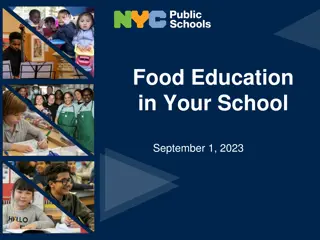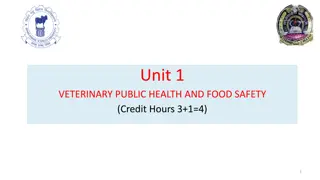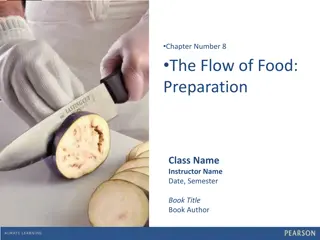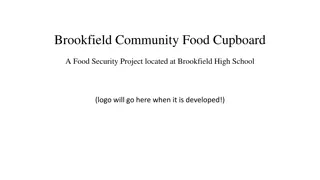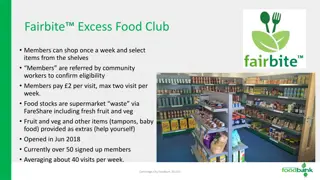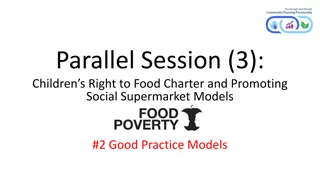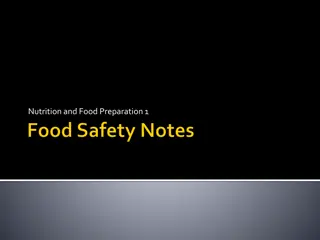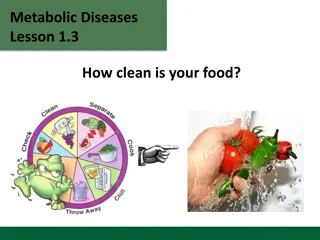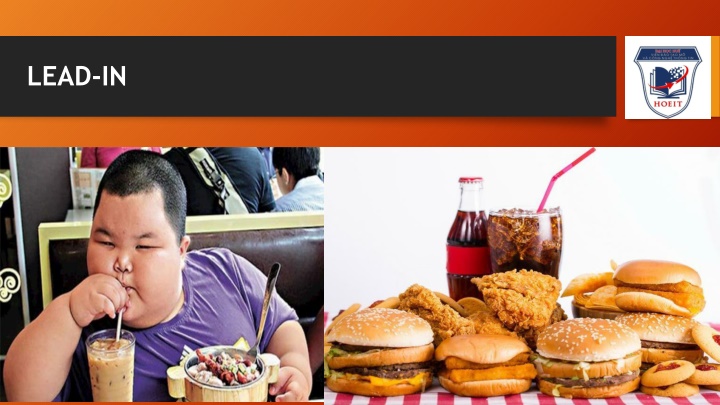
Developing Healthy Eating Habits - Food and Nutrition Education
Explore the concept of healthy eating habits through discussions on fast food, vocabulary related to food and nutrition, and student counseling scenarios. Gain insights into identifying healthy food choices and addressing unhealthy eating habits to improve overall well-being.
Download Presentation

Please find below an Image/Link to download the presentation.
The content on the website is provided AS IS for your information and personal use only. It may not be sold, licensed, or shared on other websites without obtaining consent from the author. If you encounter any issues during the download, it is possible that the publisher has removed the file from their server.
You are allowed to download the files provided on this website for personal or commercial use, subject to the condition that they are used lawfully. All files are the property of their respective owners.
The content on the website is provided AS IS for your information and personal use only. It may not be sold, licensed, or shared on other websites without obtaining consent from the author.
E N D
Presentation Transcript
LEAD-IN 1. Look at the photo of the fast food. Do you think this food is healthy or unhealthy? Why? What are some other kinds of fast food that you know? 2. Our eating habits mean the foods and ways we usually eat. What are some unhealthy eating habits? What are some problems caused by unhealthy eating habits?
UNIT 5. FOOD MSc. D NG TH H NG PH C
Objectives Knowledge: - List vocabularies food and nutrition - List words for healthy food - List expressions clarification or repetition Skills: - Improve language skills: speaking and listening, - Express opinions and support them with reasons - Ask for and give advice - Ask for and provide clarification or repetition - Debate about the role of government in reducing obesity Attitude: - Be active, excited and enthusiastic in learning. - Build a habit of using English in their careers.
1. VOCABULARY Match the phrase on the left with its meaning on the right. 1. junk food a. suggest that someone not do something 2. consumption b. do something to solve a problem 3. lose weight c. the general physical condition of the citizens of a country 4. get rid of 5. discourage 6. reduce 7. increase 8. obesity 9. public health d. become thinner e. money people are required to pay the government f. say that something is true, even though it might not be g. become greater in size, amount, number, etc. h. eating or using something i. make the amount Of size of something less than it was before j. food that is unhealthy k. remove or throw away something you do not want l. the condition of being extremely fat
2. CREATE STUDENT A: You are a counselor who works with people who are trying to develop healthier eating habits. Ask Student B some questions to find out about his/ her eating habits. Then give some advice. STUDENT B: You are tired a lot of the time. You are visiting a counselor because you want advice on how to improve your eating habits so that you will have more energy and feel better: Answer Student As questions.
2. CREATE List of possible questions How many meals do you usually eat a day? What do you eat for breakfast? Lunch? Dinner? Do you eat a lot of snacks during the day? What kinds of snacks do you eat? What is your biggest meal of the day? Where do you eat? At home? At restaurants? At your desk? In the car? Do you eat a lot of fast food? Who do you eat with? Family? Friends? Alone?
3. SPEAKING SKILL I am sorry, I am not following you I didn t catch that Are you saying that ? You mean to say that..? Do you mean that..? What do you mean by..? How do you spell ? Clarification or repetition.
3. SPEAKING SKILL Divide the class into two or more teams to debate the following statement: STATEMENT: The government should take whatever steps are necessary to reduce obesity.
3. SPEAKING SKILL 1. Your friend eats fast food all of the time and gets sick a lot. He/she isn)t overweight, but you are concerned that his/her eating habits are not healthy. Talk about some things he/ she might do. 2. Your city has a big problem with obesity. Talk about some steps the government might take to deal with the problem. 3. You are a parent, and you want your children to grow up with healthy eating habits. Talk about what you might do. You are a school principal and many of the children in your school have unhealthy eating habits and eat a lot of junk food. Talk about the steps that you might take to discourage unhealthy eating habits in the school.
5. ALTERNATIVE SPEAKING TOPICS 1.Describe the usual eating habits of people in your country, for example: How many meals do most people eat a day, and at what times? Which meal is the most important meal of the day? What kinds of food do people usually eat? Home-cooked? Take out? Fast food? Where do people usually eat their meals? At home? In restaurants? Who do people usually eat with? With family members or friends? Alone? Do you enjoy eating foods from different countries? Which country's food (other than your own) do you like best? Why do you like it? Do you think fast food can be healthy? Why or why not? Give an example of a fast food and explain why you think it is healthy or unhealthy. What's your favorite food? Why do you like it? Is it healthy or unhealthy?
6. CONSOLIDATION Food and nutrition Express opinions and support them with reasons - ask for and give advice - ask for and provide - Debate about the role of government in reducing obesity
7. HOMEWORK STEP l: Research on the Internet to find out about obesity and eating habits in a different country. Choose a country that has either a large number of obese people or a low number of obese people, STEP 2: Research the eating habits of the people in that country on the Internet or in the library, Use the questions to help you in your research. 1. Where is this country? 2. How many people are overweight? How many are obese? 3. What kinds of foods do people usually eat? Which foods are the most popular? Do they eat fast food?
7. HOMEWORK 4. What are their eating habits? For example, how often do they eat? What time of day do they eat? Where do they eat? How long do they spend cooking and eating? 5. What are some other interesting facts about STEP 3: Think about the information you found. Why do you think people are obese or not obese in this country? What can we learn from the eating habits of the people in this country? What might people in this country do to have healthier diets? STEP 4: Share your information with the class.



